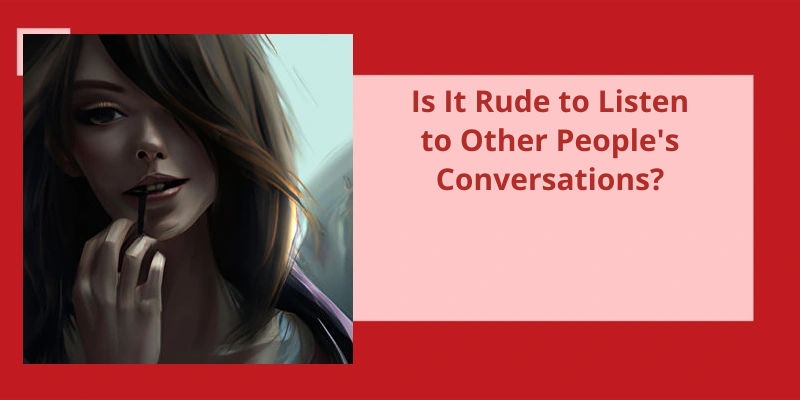It's a natural curiosity to wonder what others are saying, but it's important to consider the impact that eavesdropping can have on those around you. Whether you're invading someone's privacy, interrupting their thoughts, or causing them to feel uncomfortable, listening in on conversations that aren't meant for you can be a slippery slope towards unethical behavior. And in today's digital age, where people can be easily recorded without their knowledge or consent, eavesdropping can become a serious violation of privacy and trust. In this article, we'll explore the different aspects of eavesdropping, including it’s social, ethical, and legal implications, and provide insights on how to navigate these situations with respect and dignity.
Is It Rude to Tell Someone They’re Rude?
It can be difficult to navigate situations where someone is being rude or inappropriate, especially if it’s someone we know or care about. However, it’s important to remember that addressing their behavior isn’t necessarily rude in itself. In fact, it can be a way to maintain healthy relationships and uphold social standards. If someone is consistently acting in a way that’s hurtful or disrespectful, it’s worth discussing it with them in a respectful way.
In some cases, it may be more appropriate to simply change the subject or remove yourself from the situation. This can be especially true if the person is a stranger or acquaintance, as it may not be worth risking a potentially awkward or confrontational exchange. However, if the person is a close friend or family member, it may be worth discussing the behavior with them in more detail.
Ultimately, the goal is to encourage respectful and considerate behavior. By staying calm and tactful in our own interactions, we can help set an example for others and encourage more positive social norms. While it’s important to address rude behavior when it arises, we must also remember to approach these situations with kindness and understanding in order to achieve meaningful change.
Different Approaches to Addressing Rude Behavior Based on the Relationship With the Person
This topic discusses various ways to deal with rude behavior, depending on the relationship with the perpetrator. It explores different approaches to addressing the behavior of friends, family members, colleagues, and strangers. The aim is to provide an overview of effective methods for managing rude behavior in different contexts.
What Does It Mean When People Listen to You?
Listening also implies an openness to different beliefs and perspectives. By actively listening to someone, youre making yourself available to learn from their experiences and gain a fresh perspective on something you might not have considered before. It can be an enriching experience both for the listener and for the person being listened to.
When someone listens to you, it can also be a form of validation. So often in our lives, we feel overlooked or ignored. When someone takes the time to actively listen, theyre showing that they see us, that they value our contribution to the conversation. It can be a tremendous confidence booster and help us feel more secure in our own beliefs.
On a deeper level, listening can also be a way of building trust. When someone listens to us, we feel heard, and that creates a connection between us. Were more likely to trust someone who’s demonstrated that theyre willing to listen to us. In turn, the person doing the listening is building a reputation as a trusted confidante, someone who can be counted on to keep an open mind and offer a sympathetic ear.
Finally, listening to someone can be an act of kindness. So often, we feel like were going through our days alone, battling our own internal monologues. When someone takes the time to listen, it can be a huge relief. It’s a friendly reminder that weren’t alone in this world, that there are people who care about us and want to hear what we’ve to say. It can lift our spirits and make us feel less weighed down by our problems.
As humans, we’ve an innate desire to connect with others. Listening to someone’s conversation not only satisfies our natural curiosity but also allows us to understand and empathize with others. It can lead to better communication, deeper relationships, and a more enjoyable experience for everyone involved. So why not try listening a little more? You never know what you might learn or who you might connect with.
Why Do I Like Listening to Other People’s Conversations?
For me, listening to other peoples conversations isn’t just about being curious or nosy. It’s an art form that allows me to explore the perspectives and experiences of others, irrespective of their backgrounds or opinions. Listening to others helps me to broaden my own mindset and think critically about the world around me. It also provides me with an opportunity to learn about different cultures and traditions that I might otherwise not have known about.
Furthermore, listening to others is a great way to improve my own communication skills. By paying attention to how others speak, I can pick up on new vocabulary, sentence structures, and ways of expressing ideas. It helps me to become more articulate and articulate my own thoughts and opinions in a more effective manner. Additionally, it teaches me how to be an active listener and respond appropriately to other peoples needs and concerns.
In a world filled with distractions and noise, listening to others is a way of grounding myself and staying present in the moment. It allows me to put aside my own problems and focus on someone elses needs. It’s a simple yet powerful act of kindness that can make a significant difference in someones day. By listening to others, we can build better relationships, cultivate mutual respect and understanding, and create a more harmonious world.
Listening to other peoples conversations isn’t just a hobby for me. It’s a way of life that’s transformed the way I interact with others and see the world. It’s an act of self-care and a way of making the world a better place, one conversation at a time.
In a world where everyone has an opinion and social media allows us to share them freely, it can be difficult not to get caught up in other people’s conversations or be influenced by their opinions. However, it’s important to remember that it’s okay to have your own thoughts and beliefs and that you don’t always have to agree with others. This is a lesson that Jay Shetty has learned and shares with us through his six tips on how to stop listening to other people’s opinions. Let’s take a closer look at his advice and how it can help us live a more fulfilling life.
How Do You Not Listen to Other People’s Conversations?
It’s natural to be curious and interested in what others are saying, especially when they’re speaking loudly or in close proximity. However, there are times when it’s best to focus on your own thoughts and not pay attention to what’s happening around you. One way to do this is by practicing mindfulness- when you’re aware of the present moment, it’s easier to tune out external distractions.
Another strategy is to consider the source of the conversation. If it’s not a topic that concerns you or if it’s just idle gossip, it’s better to disengage and focus on something else. Additionally, it’s important to recognize that not everyone has your best interests at heart. If someone is always critical or negative, it’s best to limit your exposure to them.
It’s also important to recognize that seeking advice from everyone isn’t always a good idea. While it’s helpful to have a trusted confidante or mentor, too many opinions can be overwhelming and confusing. It’s okay to trust your own instincts and make decisions based on what feels right for you.
Ultimately, the opinions of others don’t define who you’re or your reality. Only you know what’s best for you and what you value most. Trusting your intuition and staying true to yourself is the key to a fulfilling and meaningful life.
Learning to not listen to other peoples conversations is a valuable skill that can improve your quality of life. By being mindful, considering the source, limiting exposure, and trusting your intuition, you can tune out external distractions and focus on what’s most important to you. Remember that you don’t have to live up to others opinions- your reality is defined by you alone.
When someone asks you to listen to them, it often means that they want to share something with you or express their thoughts and feelings. However, listening goes beyond just hearing the words being said. It involves actively engaging with the speaker, paying attention to their tone and body language, and trying to understand their perspective. In this article, we will delve deeper into the meaning of “listen to you” and explore how active listening can enhance communication and relationships.
What Does It Mean When Someone Says Listen to You?
When someone says “listen to you,” they’re indicating that they want to hear what you’ve to say and that they’re willing to give you their undivided attention. Listening is an essential part of communication, and it involves more than simply hearing the words that are being spoken. It requires fully engaging with the speaker and being mentally present in the conversation. By listening, you can understand what the other person is thinking, feeling, and saying.
There are many different factors that can impact the way someone communicates, such as their tone, body language, and facial expressions. By paying attention to these aspects of communication, you can better understand the message that’s being conveyed and respond appropriately.
This could be a piece of information, a request, or even something more personal, like their feelings or emotional state. By actively listening, you demonstrate that you respect and value the other person, and that you’re invested in the conversation.
However, listening isn’t always easy. Our minds are constantly racing with thoughts and distractions, and it can be challenging to fully focus on what someone is saying, especially for extended periods. Additionally, there may also be language barriers, cultural differences, or other factors that can make communication more challenging.
By actively listening and engaging with the speaker, you can better understand their message and build stronger, more meaningful relationships.
Source: Thesaurus article: to listen to someone or something
Conclusion
It's important to respect people's privacy and personal space, especially when it comes to their conversations. Eavesdropping can make them feel uncomfortable or violated, and it can also lead to misunderstandings or negative consequences. In some cases, listening in on others' conversations can even be illegal or unethical. Instead of succumbing to the temptation to eavesdrop, it's better to focus on our own experiences and interactions, and to engage with others in a respectful and considerate manner. By doing so, we can create a more positive and empathetic community that values privacy and communication in equal measure.






